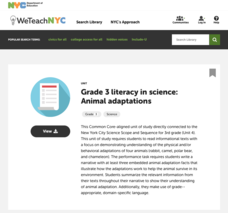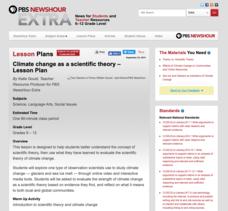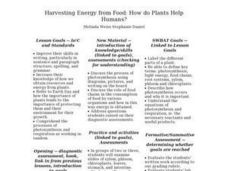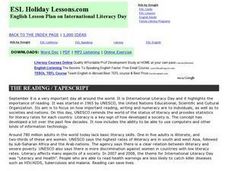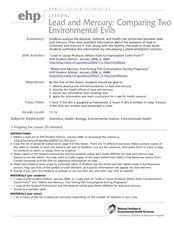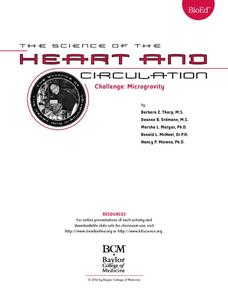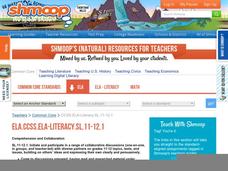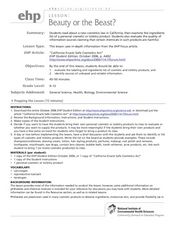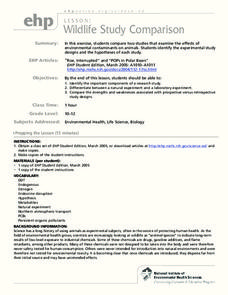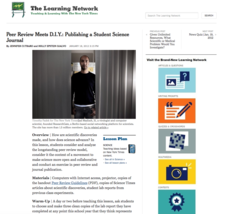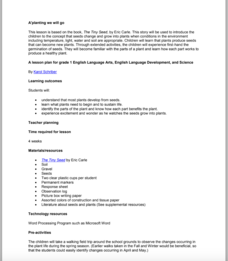New York City Department of Education
Grade 3 Literacy in Science: Animal Adaptations
Third graders research and study animal adaptations and then use their findings to write narratives that include scientific criterion. This lesson is all about literacy and science! The lesson is completely designed for addressing Common...
PBS
Climate Change as a Scientific Theory
Get your class thinking about climate change as a scientific theory. Guided by a handout, emerging earth scientists read articles and take notes about glaciers and sea ice. To conclude, they write an evaluation of the evidence for...
Curated OER
Harvesting Energy from Food: How do Plants Help Humans?
Beginning botanists view slides of plant vascular tissue. They watch Magic School Bus Gets Planted, which you can find online, and then write a summary of what they have learned about plants. This lesson could be used with upper...
Pulitzer Center
Extractive Industries
Here is a chance for environmental studies classes to take a critical look at crises occurring around the globe by reading articles and viewing video clips. The human activities under scrutiny are the extraction of oil, logging, and...
Curated OER
Scientific Root Words, Prefixes, and Suffixes
It's hard to imagine that anything was missed on this five-page list of science roots, prefixes, and suffixes! Listed in alphabetical order, all are included in a single, two-column list. This may be especially useful for advanced...
Curated OER
Literacy Lesson: Guided Reading
Here is a wonderful instructional activity designed for students with special needs. This well-thought-out instructional activity uses Big Books, familiar stories, and has a lot of review learning built into it. The book, The Keeping...
Curated OER
International Literacy Day
In this International Literacy Day worksheet, students complete activities such as reading a passage, matching phrases, fill in the blanks, correct word choosing, multiple choice, sequencing, unscramble the sentences, write questions,...
Curated OER
Death by Particles
Emerging epidemiologists define relative risk and read an article about the effect of particulate pollution on the cardiovascular health of women. They record the relative risk values, graph them, and answer analysis questions. This is a...
Curated OER
Obesity
Class members participate in a discussion, read a newspaper article, and participate in activities meant to open their eyes to the problem of obesity in the US. There are resource links, electronic worksheets, and teacher's notes to help...
Curated OER
Lead and Mercury: Comparing Two Environmental Evils
High schoolers in chemistry or health courses look at the material safety data sheet (MSDS) and periodic table of elements to gather information about mercury and lead, two toxic materials that have been found in food products. They read...
Curated OER
A Yen for Maximum Residue Limits in Food
Future public health officials or agriculturists read an article and answer questions concerning the Japanese regulations for pesticide exposure. They compare the maximum residue limit for two, 4-D of Japan with other countries. This is...
Baylor College
Challenge: Microgravity
What a festive way to examine what happens to the heart in different gravitational situations! Small groups place a water-filled balloon in different locations (on a table top, in a tub of water, and held in a vertical position), drawing...
Shmoop
ELA.CCSS.ELA-Literacy.SL.11-12.1
You want your class to meet all of the Common Core standards, and here is one way to tackle the first speaking and listening standard. Given a theme to focus on from "How Much Land Does a Man Need?" by Leo Tolstoy, small groups come up...
Shmoop
ELA.CCSS.ELA-Literacy.SL.11-12.2
One way to get your class to evaluate and synthesize multiple multimedia sources is through a research project. The idea here is that class members will watch videos and listen to scientific debates in order to create a casebook about...
Curated OER
Beauty or the Beast
Does the FDA really intend to protect public health? Spark a debate in your chemistry or health class by using this article, titled "Beauty or the Beast." It questions the safety of cosmetics and toiletry products, govenment regulations,...
Curated OER
Tracing The Origins of Autism: A Spectrum of New Studies
Has the occurrence of autism increased over the years, or do the changes in diagnostic criteria account for the difference? High schoolers read an article about autism spectrum disorders and the related epidemiological studies that have...
Minnesota Literacy Council
Scientific Method
Here is a resource with a descriptive approach to explaining the scientific method. It's simple, but effective for both introduction and reinforcement of this concept.
Curated OER
Wildlife Study Comparison
Environmental science classes read articles about two different scientific studies. One is about the effects of contraceptive chemicals on fertility, and the other is about how a pesticide may be reducing bone density in exposed...
Tumblehome
Resisting Scientific Misinformation
How do scholars determine if a scientific claim is true? Learners investigate scientific misinformation by watching video clips and reading false advertising claims. They engage in discussion in both class and small group settings to...
Curated OER
Taming of the Shrew, Act 4.3, Study Questions
Shakespeare can be a challenge to the most skilled high school readers. This selection of short answer questions helps increase understanding of the character, Katherine, by addressing dialogue, tone of voice, making inferences, and...
Curated OER
Peer Review Meets D.I.Y.: Publishing a Student Science Journal
Peer review of science laboratory reports? You bet! First, learners work in pairs to review a scientific article. Then they trade lab reports for peer review. The end result is the publication of a classroom scientific journal!
Howard Hughes Medical Institute
Gorongosa: Scientific Inquiry and Data Analysis
How does the scientific process begin? Introduce ecology scholars to scientific inquiry through an insightful, data-driven lesson. Partners examine data from an ongoing research study to determine the questions it answers. The resource...
Curated OER
A'planting We will Go
Germination is an amazing process that results in amazing things. The book The Tiny Seed is the inspiration for a set of activities that will help build early literacy, observation, language, and writing skills. The class observes how...
Curated OER
'Hunger Games' Science: Investigating Genetically Engineered Organisms
In The Hunger Games novel and movie, a futuristic, dystopian society is the setting. In it, a genetically engineered bird escapes control of the government. Using this as a starting point, teenagers examine the realistic possibility of...


